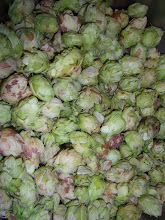What does authenticity mean to craft beer? What sets it apart from corporate beer, and how have these definitions changed as craft beer moved from the margins to the mainstream? Craft authenticity initially focused on flavor; Stone’s “fizzy yellow beer” campaign was prototypical in identifying the limits of corporate beer. But recently, craft beer has had little new to add regarding the tension between beer as artisanal versus commodity, specifically from the largest names
 in craft brewing. Take, for example, the differing receptions accorded to Redhook’s decision to sell a 25% stake to Anheuser-Busch in 1995—met with industry-wide scorn—and the positive gloss given to recent new brewery openings by Sierra Nevada, New Belgium, and Lagunitas. While ownership remains in craft hands, these breweries are pursuing the business model of corporate beer, with multiple locations across the country intended to maximize distribution, production, and profit. This marks a new era, one where large craft breweries combine the anti-corporate, non-conformist ethos of early craft brewing with the economic power and privilege of corporate macrobreweries. In this sense, craft authenticity currently speaks more to the image of craft beer than to the beer itself. As a revolutionary gesture, the heyday of craft authenticity—of brewing as counter-normative—has certainly passed, even if we refuse to let it go.
in craft brewing. Take, for example, the differing receptions accorded to Redhook’s decision to sell a 25% stake to Anheuser-Busch in 1995—met with industry-wide scorn—and the positive gloss given to recent new brewery openings by Sierra Nevada, New Belgium, and Lagunitas. While ownership remains in craft hands, these breweries are pursuing the business model of corporate beer, with multiple locations across the country intended to maximize distribution, production, and profit. This marks a new era, one where large craft breweries combine the anti-corporate, non-conformist ethos of early craft brewing with the economic power and privilege of corporate macrobreweries. In this sense, craft authenticity currently speaks more to the image of craft beer than to the beer itself. As a revolutionary gesture, the heyday of craft authenticity—of brewing as counter-normative—has certainly passed, even if we refuse to let it go.
Apparently, that means I have to write the damn thing.
Sometimes I love my job.
Sometimes I love my job.
(3/9/2015)

No comments:
Post a Comment